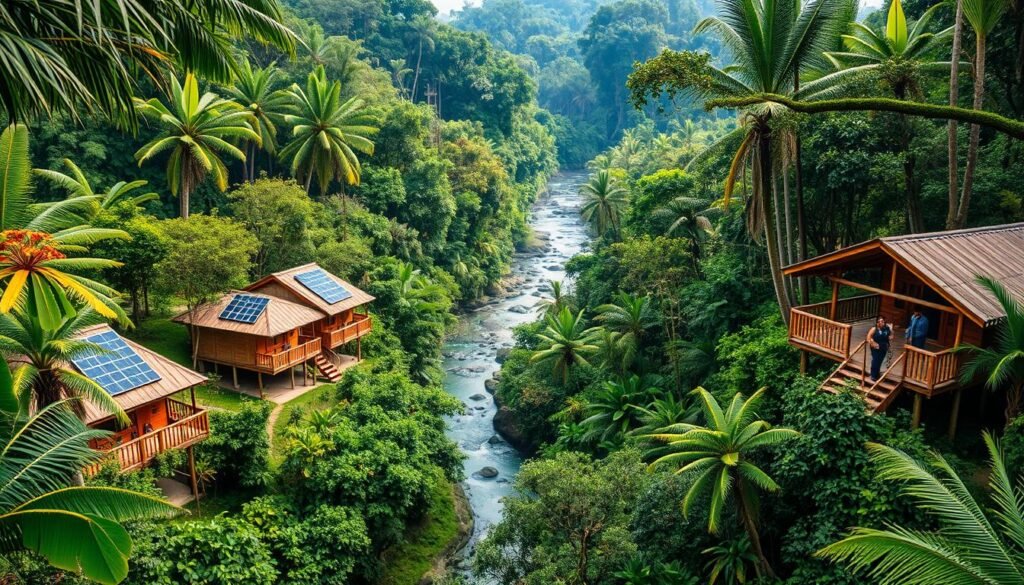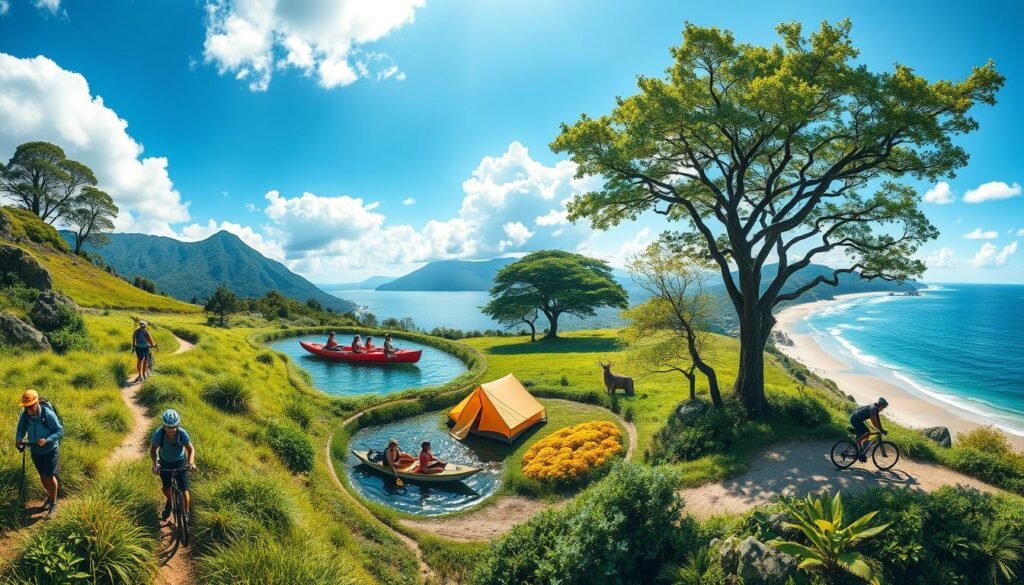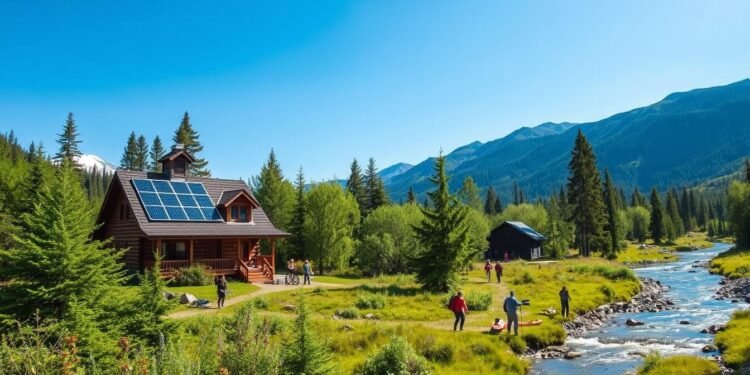The world is waking up to its environmental impact, and eco-friendly travel is on the rise. By 2050, over 1.4 billion people will travel for fun, almost double today’s number. This growth in sustainable tourism is a chance for adventurers to see the world while caring for it and supporting local people.
Eco-adventures include rainforest hikes and wildlife projects. They aim to protect nature, share cultures, and help local economies. Green travel experiences and responsible tourism packages are becoming more popular. They meet the needs of travelers who want to make a difference without harming the planet.
Key Takeaways
- Eco-friendly travel is experiencing a surge in popularity, with an estimated 1.4 billion leisure travelers by 2050.
- Sustainable travel tours and experiences focus on preserving the environment, supporting local communities, and promoting cultural awareness.
- Eco-adventures range from guided nature walks to wildlife conservation projects, offering unique, low-impact experiences for conscious travelers.
- Green travel experiences and responsible tourism packages are becoming more widely available, catering to the growing demand for sustainable travel options.
- Intrepid Foundation, G Adventures, Pura Aventura, and other eco-friendly travel companies are leading the way in sustainable tourism practices.
Understanding Eco-Friendly Travel
In today’s world, sustainable outdoor adventures, carbon-neutral vacations, and environmentally conscious excursions are more popular than ever. Eco-tourism is leading the way, as people want to reduce their carbon footprint and help protect nature.
What is Eco-Tourism?
Eco-tourism means traveling responsibly to natural places. It aims to protect the environment and help local people. It promotes sustainable living, supports communities, and helps us appreciate nature more.
Benefits of Sustainable Travel
- Minimizes negative environmental impact
- Supports conservation efforts and protects natural habitats
- Provides positive experiences for both visitors and host communities
- Boosts local economies and empowers indigenous cultures
- Encourages more environmentally conscious behavior among travelers
How to Choose Eco-Friendly Options
When planning your next trip, look for eco-friendly tour operators and places to stay. Choose activities that care for the environment and support local people. Check for certifications and see if they really care about the planet and communities.
“Sustainable tourism is not just about protecting the environment, it’s about creating positive social and economic impacts as well. It’s a holistic approach to travel that benefits both the traveler and the local community.”
By choosing eco-friendly travel, you can enjoy sustainable outdoor adventures, carbon-neutral vacations, and environmentally conscious excursions. These trips can make a big difference in the world, leaving it better than when you arrived.
Popular Eco-Friendly Destinations
More people want to travel in a way that’s good for the planet. Many places around the world are now focusing on being eco-friendly. They offer Ethical Travel Operators and Low-Impact Nature Trips to help protect nature.
Top Cities Embracing Sustainability
Norway is a top pick for eco-friendly travel. It’s known for its green hotels, wildlife tours, and green transport. Bhutan is working hard to be zero waste by 2030. It’s a place where nature and culture meet.
Sweden is all about being green. It has eco-friendly hotels and green transport. Singapore shows how cities can be green and still offer modern comforts.
Nature Reserves and National Parks
Costa Rica is a leader in eco-tourism. It has strict rules to protect the environment. Palau is famous for its pledge to protect marine life. It’s the first place to have a shark sanctuary.
Kerala, India, is known as “God’s Own Country.” It offers a mix of culture, backwaters, and wildlife. It’s a top choice for those who love nature and culture.
Beaches Committed to Protecting Marine Life
The Bahamas has places like Kamalame Cay and Tiamo Resort. They focus on protecting the environment. In Pangulasian Island, Philippines, they clean up the coast and protect turtles.
“Sustainable tourism is not just about reducing our impact, but also about creating positive change and contributing to the well-being of local communities and the environment.”

These places are at the forefront of sustainable tourism. They offer travelers a chance to see the world while being kind to it. By choosing Ethical Travel Operators and Low-Impact Nature Trips, we can make a difference.
Eco-Friendly Travel Tours
Start a journey that celebrates our planet’s beauty and supports green practices. Top Eco-Friendly Travel Tours and activities promote sustainability. They offer experiences that mix adventure, conservation, and culture.
From guided nature walks and hikes to wildlife conservation and community tourism, these tours help travelers positively impact their destinations.
Guided Nature Walks and Hikes
Explore the natural world on guided eco-friendly hikes and walks. The Wukalina Walk in Tasmania, Australia, is led by Palawa guides. It’s a 34km coastal journey that shows off the area’s culture and landscapes.
In Kyoto, Japan, cyclists can ride through historical sites and bamboo forests. This supports the local economy and environment.
Wildlife Conservation Experiences
Dive into wildlife conservation efforts worldwide. At Kenya’s Ol Pejeta Conservancy, you can camp in a rhino sanctuary. This supports local efforts to save endangered species.
In Yala National Park, Sri Lanka, eco-friendly safaris let you see animals like leopards and elephants. These tours help conservation efforts.
Community-Based Tourism
Connect with local communities and learn about their traditions and green practices. In Fiji, resorts have coral planting activities. This helps protect the island’s coral reefs.
In Tuscany, Italy, farm stays and wine tours let you support local agriculture. You can also enjoy the region’s rural beauty.
“Sustainable travel is not just about reducing our carbon footprint; it’s about creating meaningful connections with the places we visit and the people who call them home.”
Sustainable Activities You Can Enjoy
More people want to travel in a way that’s good for the planet. They look for activities that let them connect with nature and local communities. There are many sustainable outdoor adventures to try, like organic farm tours and wildlife safaris.
Organic Farm Tours and Workshops
Rancho Margot in Costa Rica is a great example. It’s an eco-lodge where you can learn about growing food organically and using renewable energy. You can even help with farm tasks like milking cows and picking veggies.
This experience teaches you how important it is to travel green. It shows how we can live in harmony with nature.
Responsible Wildlife Safaris
If you love watching wildlife, check out Whale Watch Kaikoura in New Zealand. They offer safe whale-watching tours that don’t disturb the animals. In Namibia, you can join the San people and learn about desert survival.
Eco-Friendly Water Sports
In Fiji, you can help plant coral reefs. This is a great way to protect the marine life and the reefs. It’s a hands-on way to support sustainable travel and outdoor adventures.

“Sustainable tourism is not just about being eco-friendly, it’s about creating experiences that positively impact local communities and the environment.”
Accommodations That Promote Sustainability
Travelers now look for Carbon-Neutral Vacations and Environmentally Conscious Excursions. Eco-friendly places to stay are becoming more popular. These spots not only help the planet but also offer special experiences for guests.
Green Hotels and Eco-Resorts
Green hotels and eco-resorts are at the forefront of sustainable travel. They focus on using less energy, choosing renewable energy, and managing waste well. For example, the Chalalán Eco-Lodge in Bolivia works with the local Indigenous community and offers a peaceful stay surrounded by nature.
Unique Lodging Options: Treehouses and Yurts
For those who want to connect with nature, treehouses and yurts are great choices. These structures fit right into their natural surroundings, offering a cozy and real experience. In Australia, the underground motels in Coober Pedy are another example of smart, eco-friendly places to stay.
Camping and Glamping with a Purpose
Camping and glamping are becoming more popular with eco-aware travelers. These options help reduce environmental impact and support conservation. For example, the Ol Pejeta Conservancy in Kenya offers camping that helps protect endangered animals.
Many sustainable places to stay have recycling, use renewable energy, and save water. Choosing these places lets travelers enjoy unique experiences while helping the planet and supporting local communities.
“Sustainable tourism is not just about the environment, but also about supporting local communities and economies. By choosing eco-friendly accommodations, travelers can make a positive impact on the places they visit.”
Eco-Friendly Travel Essentials
As eco-conscious travelers, we must reduce our environmental impact. There are many eco-friendly travel essentials that help us do this. These include reusable water bottles and solar-powered chargers. They make a big difference in our journey to greener travel.
Sustainable Packing List
- Reusable water bottle or flask to avoid single-use plastic
- Biodegradable toiletries and personal care products
- Reusable shopping bags for groceries and souvenirs
- Compact solar-powered charger for electronic devices
- Bamboo cutlery set to reduce waste from disposable utensils
- Insulated lunch box to store food and reduce food waste
Eco-Friendly Travel Gadgets
There are also innovative eco-friendly travel gadgets. These gadgets help us reduce our environmental impact. They also make our travel more convenient.
| Gadget | Sustainability Benefits |
|---|---|
| Portable solar charger | Generates renewable energy to power our devices without draining the grid |
| Reusable coffee cup | Reduces waste from disposable cups, often made from non-recyclable materials |
| Eco-friendly luggage | Made from sustainable materials like recycled plastic or bamboo, reducing the environmental footprint of our travel gear |
Tips for Reducing Your Carbon Footprint
There are many ways to reduce our carbon footprint while traveling. By making conscious choices, we support Ethical Travel Operators and Low-Impact Nature Trips.
- Opt for public transportation or carpooling whenever possible to minimize emissions from individual vehicles.
- Support local businesses and Ethical Travel Operators that prioritize sustainability and social responsibility.
- Participate in carbon offset programs to compensate for the emissions generated by your travel.
- Choose longer stays in fewer destinations to reduce the environmental impact of transportation.
- Avoid single-use plastics and disposables, and embrace reusable alternatives.
By using these eco-friendly travel essentials and practices, we can travel sustainably. We can explore the world while protecting the planet. Together, we can make a difference.
Getting Involved: Volunteer Opportunities
Eco-conscious travelers can find many volunteer opportunities to make a difference. These include eco-voluntourism programs and conservation projects worldwide. They offer a chance to help the environment and learn about local cultures.
Eco-Voluntourism Programs
Places like International Volunteer HQ (IVHQ) and GoEco offer affordable volunteer spots in over 50 countries. These programs let you help with projects like reforestation in Costa Rica or wildlife care in South Africa.
Conservation Projects Around the World
Travelers can also join conservation efforts. Maximo Nivel has spots in Peru, Guatemala, and Costa Rica for tasks like sea turtle protection and jungle restoration. Balboa Fun Tours in Panama also supports local conservation through volunteer work.
Community Service Learning Experiences
For those wanting to help communities, there are programs that mix service and cultural exchange. You can teach English or work on projects that help local communities. These experiences let you use your skills and make real connections.















